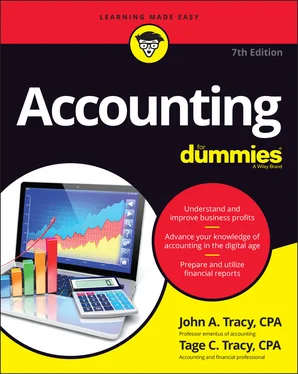John A. Tracy - Accounting For Dummies
Здесь есть возможность читать онлайн «John A. Tracy - Accounting For Dummies» — ознакомительный отрывок электронной книги совершенно бесплатно, а после прочтения отрывка купить полную версию. В некоторых случаях можно слушать аудио, скачать через торрент в формате fb2 и присутствует краткое содержание. Жанр: unrecognised, на английском языке. Описание произведения, (предисловие) а так же отзывы посетителей доступны на портале библиотеки ЛибКат.
- Название:Accounting For Dummies
- Автор:
- Жанр:
- Год:неизвестен
- ISBN:нет данных
- Рейтинг книги:3 / 5. Голосов: 1
-
Избранное:Добавить в избранное
- Отзывы:
-
Ваша оценка:
- 60
- 1
- 2
- 3
- 4
- 5
Accounting For Dummies: краткое содержание, описание и аннотация
Предлагаем к чтению аннотацию, описание, краткое содержание или предисловие (зависит от того, что написал сам автор книги «Accounting For Dummies»). Если вы не нашли необходимую информацию о книге — напишите в комментариях, мы постараемся отыскать её.
Accounting For Dummies
Accounting For Dummies — читать онлайн ознакомительный отрывок
Ниже представлен текст книги, разбитый по страницам. Система сохранения места последней прочитанной страницы, позволяет с удобством читать онлайн бесплатно книгу «Accounting For Dummies», без необходимости каждый раз заново искать на чём Вы остановились. Поставьте закладку, и сможете в любой момент перейти на страницу, на которой закончили чтение.
Интервал:
Закладка:
 This also touches on a concept that you may hear from time to time — that accounting is just as much of an art form as a science. What we mean by this is that while accounting is a technical profession that has a large amount of authoritative content to work with and provides guidance, the actual application of accounting concepts, rules, and regulations (in the real world where internal management pressures can be significant) is often fairly subjective.
This also touches on a concept that you may hear from time to time — that accounting is just as much of an art form as a science. What we mean by this is that while accounting is a technical profession that has a large amount of authoritative content to work with and provides guidance, the actual application of accounting concepts, rules, and regulations (in the real world where internal management pressures can be significant) is often fairly subjective.
Leave good audit trails
Good accounting systems leave good audit trails. An audit trail is a clear-cut, well-marked path of the sequence of events leading up to an entry in the accounts, starting with the source documents and following through to the final posting in the accounts; an auditor can “re-walk” the path. Even if a business doesn’t have an outside CPA do an annual audit, the accountant has frequent occasion to go back to the source documents and either verify certain information in the accounts or reconstruct the information in a different manner. Suppose that a salesperson is claiming some suspicious-looking travel expenses; the accountant would probably want to go through all of this person’s travel and entertainment reimbursements for the past year.
 If the IRS comes in for a field audit of your income tax return, you’d better have good audit trails to substantiate all your expense deductions and sales revenue for the year. The IRS has rules about saving source documents for a reasonable period of time and having a well-defined process for making bookkeeping entries and keeping accounts. Think twice before throwing away or deleting source documents too soon. Also, ask your accountant to demonstrate and lay out for your inspection the audit trails for key transactions, such as cash collections, sales, cash disbursements, and inventory purchases. Even computer-based accounting systems recognize the importance of audit trails. Well-designed computer programs provide the ability to backtrack through the sequence of steps in the recording of specific transactions.
If the IRS comes in for a field audit of your income tax return, you’d better have good audit trails to substantiate all your expense deductions and sales revenue for the year. The IRS has rules about saving source documents for a reasonable period of time and having a well-defined process for making bookkeeping entries and keeping accounts. Think twice before throwing away or deleting source documents too soon. Also, ask your accountant to demonstrate and lay out for your inspection the audit trails for key transactions, such as cash collections, sales, cash disbursements, and inventory purchases. Even computer-based accounting systems recognize the importance of audit trails. Well-designed computer programs provide the ability to backtrack through the sequence of steps in the recording of specific transactions.
Keep alert for unusual events and developments
 Business managers should encourage their accountants to stay alert to anything out of the ordinary that may require attention. Suppose that the accounts receivable balance for a customer is rapidly increasing — that is, the customer is buying more and more from your company on credit but isn’t paying for these purchases quickly. Maybe the customer has switched more of his company’s purchases to your business and is buying more from you only because he’s buying less from other businesses. But maybe the customer is planning to stiff your business and take off without paying his debts. Or maybe the customer is planning to go into bankruptcy soon and is stockpiling products before the company’s credit rating heads south.
Business managers should encourage their accountants to stay alert to anything out of the ordinary that may require attention. Suppose that the accounts receivable balance for a customer is rapidly increasing — that is, the customer is buying more and more from your company on credit but isn’t paying for these purchases quickly. Maybe the customer has switched more of his company’s purchases to your business and is buying more from you only because he’s buying less from other businesses. But maybe the customer is planning to stiff your business and take off without paying his debts. Or maybe the customer is planning to go into bankruptcy soon and is stockpiling products before the company’s credit rating heads south.
Don’t forget internal time bombs: A bookkeeper’s reluctance to take a vacation could mean that they don’t want anyone else looking at the books.
To some extent, accountants have to act as the eyes and ears of the business. Of course, that’s one of the main functions of a business manager as well, but the accounting staff can play an important role.
Design truly useful reports for managers
We’ve seen too many off-the-mark accounting reports to managers — reports that are difficult to decipher and not very useful or relevant to the manager’s decision-making needs and control functions. These bad reports waste the manager’s time, one of the most serious offenses in management accounting.
Part of the problem lies with the managers themselves. As a business manager, have you told your accounting staff what you need to know, when you need it, and how to present it in the most efficient manner? When you stepped into your position, you probably didn’t hesitate to rearrange your office, and maybe you even insisted on hiring your own support staff. Yet you most likely lie down like a lapdog regarding your accounting reports. Maybe you assume that the reports have been done a certain way and that arguing for change is no use.
 On the other hand, accountants bear a good share of the blame for poor management reports. Accountants should proactively study the manager’s decision-making responsibilities and provide the information that is most useful, presented in the most easily digestible manner. To a certain extent, this is what we mean when we say “reliable” (in the acronym CART). While financial information may be accurate, reliability speaks to the concept of producing and reporting financial information in a way that truly benefits a business manager and assists them in making informed business decisions. Don’t assume that accuracy automatically equates to reliability.
On the other hand, accountants bear a good share of the blame for poor management reports. Accountants should proactively study the manager’s decision-making responsibilities and provide the information that is most useful, presented in the most easily digestible manner. To a certain extent, this is what we mean when we say “reliable” (in the acronym CART). While financial information may be accurate, reliability speaks to the concept of producing and reporting financial information in a way that truly benefits a business manager and assists them in making informed business decisions. Don’t assume that accuracy automatically equates to reliability.
In designing the chart of accounts, the accountant should keep in mind the type of information needed for management reports. To exercise control, managers need much more detail than what’s reported on tax returns and external financial statements. And as we explain in Chapter 15, expenses should be regrouped into different categories for management decision-making analysis. A good chart of accounts looks to both the external and the internal (management) needs for information.
 So what’s the answer for a manager who receives poorly formatted reports? Demand a report format that suits your needs! See Chapter 15for a useful profit report model, and show it to your accountant as well.
So what’s the answer for a manager who receives poorly formatted reports? Demand a report format that suits your needs! See Chapter 15for a useful profit report model, and show it to your accountant as well.
Enforcing Strong Internal Controls
 Any accounting system worth its salt should establish and vigorously enforce effective internal controls — basically, additional forms and procedures over and above what’s needed strictly to move operations along. These additional procedures serve to deter and detect errors (honest mistakes) and all forms of dishonesty by employees, customers, suppliers, and even managers themselves. Unfortunately, many businesses pay only lip service to internal controls; they don’t put into place good internal controls, or they don’t seriously enforce their internal controls (they just go through the motions).
Any accounting system worth its salt should establish and vigorously enforce effective internal controls — basically, additional forms and procedures over and above what’s needed strictly to move operations along. These additional procedures serve to deter and detect errors (honest mistakes) and all forms of dishonesty by employees, customers, suppliers, and even managers themselves. Unfortunately, many businesses pay only lip service to internal controls; they don’t put into place good internal controls, or they don’t seriously enforce their internal controls (they just go through the motions).
Internal controls are like highway truck weigh stations, which make sure that a truck’s load doesn’t exceed the limits and that the truck has a valid plate. You’re just checking that your staff is playing by the rules. For example, to prevent or minimize shoplifting, many retailers use video surveillance as well as tags that set off the alarms if the customer leaves the store with the tag still on the product. Likewise, a business should implement certain procedures and forms to prevent (as much as possible) theft, embezzlement, kickbacks, fraud, and simple mistakes by its own employees and managers.
The Sarbanes-Oxley Act of 2002 (often referred to as SOX) applies to public companies that are subject to the federal Securities and Exchange Commission (SEC) jurisdiction. Congress passed this law mainly in response to Enron and other massive financial reporting fraud disasters. The act, which is implemented through the SEC and the Public Company Accounting Oversight Board (PCAOB), requires that public companies establish and enforce a special module of internal controls over external financial reporting.
Читать дальшеИнтервал:
Закладка:
Похожие книги на «Accounting For Dummies»
Представляем Вашему вниманию похожие книги на «Accounting For Dummies» списком для выбора. Мы отобрали схожую по названию и смыслу литературу в надежде предоставить читателям больше вариантов отыскать новые, интересные, ещё непрочитанные произведения.
Обсуждение, отзывы о книге «Accounting For Dummies» и просто собственные мнения читателей. Оставьте ваши комментарии, напишите, что Вы думаете о произведении, его смысле или главных героях. Укажите что конкретно понравилось, а что нет, и почему Вы так считаете.












